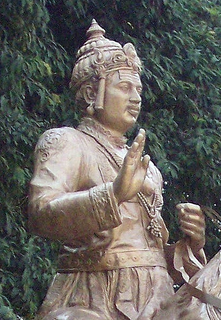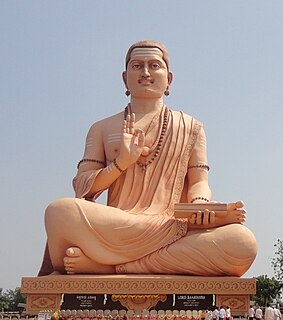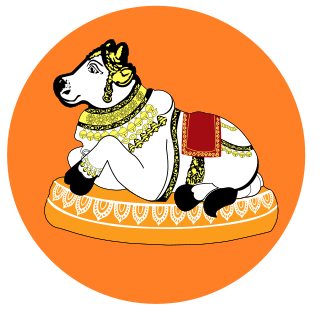
Lingayatism or Veera Saivism is a Hindu denomination based on Shaivism. Initially known as Veerashaivas, since the 12th-century adherents of this faith are known as Lingayats. The terms Lingayatism and Veerashaivism have been used synonymously, but Veerashaivism may refer to the broader Veerashaiva philosophy which predates Lingayatism, to the historical community now called Lingayats, and to a contemporary (sub)tradition within Lingayatism with Vedic influences.

Basaveshwara, colloquially known as Basavanna, was a 12th-century CE Indian statesman, philosopher, poet, Lingayat social reformer in the Shiva-focussed bhakti movement, and a Hindu Shaivite social reformer during the reign of the Kalyani Chalukya/Kalachuri dynasty. Basava was active during the rule of both dynasties but reached the peak of his influence during the rule of King Bijjala II in Karnataka, India.

Śrāvaṇa is the fifth month of the Hindu calendar. In India's national civil calendar, Śrāvaṇa is the fifth month of the year, beginning on July 23 and ending on August 22. In the Tamil calendar, it is known as Āvani and is the fifth month of the solar year. In lunar religious calendars, Śrāvaṇa begins on the new moon or the full moon and is the fifth month of the year. Srabon is the fourth month of the solar Bengali calendar. It is also the fourth month of the Nepali calendar. Śrāvaṇa is also the second month of Varsha.

Akka Mahadevi ಅಕ್ಕ ಮಹಾದೇವಿ (c.1130–1160) was one of the early female poets of the Kannada literature and a prominent person in the Lingayat Shaiva sect in the 12th century. Her 430 extant Vachana poems, and the two short writings called Mantrogopya and the Yogangatrividhi are considered her most notable contribution to Kannada literature. She composed fewer poems than other saints of the movement. The term Akka is an honorific given to her by great Lingayat saints such as Basavanna, Siddharama and Allamaprabhu and an indication of her high place in the spiritual discussions held at the "Anubhava Mantapa". She is seen as an inspirational woman in Kannada literature and in the history of Karnataka. She considered the god Shiva as her husband,.

Basappa Danappa Jatti was the fifth vice president of India, serving from 1974 to 1979. He was acting President of India from 11 February to 25 July 1977. The soft-spoken Jatti rose from a humble beginning as a Municipality member to India's second-highest office during a five-decade-long chequered political career.

Allamaprabhu was a 12th-century mystic-saint and Vachana poet of the Kannada language, propagating the unitary consciousness of Self and Shiva. Allamaprabhu is one of the celebrated poets and the patron saint of the Lingayata movement that reshaped medieval Karnataka society and popular Kannada literature. He is included among the "Trinity of Lingayathism", along with Basavanna, the founder of the movement, and Akka Mahadevi, the most prominent woman poet.
Channabasavanna also known as " Guru Channabasaveshwara " was Basava's nephew and one of the foremost Sharanas of the 12th century. He, along with Basava, Allama Prabhu and Akka Mahadevi, played a pivotal role in the propagation of the Lingayat faith. He was the youngest among the sharana leaders and grew up in the household of Basavanna as he was the son of Nagalambike, Basava's own sister. He also wrote the Karana Hasuge which is one of the most sacred texts of the Lingayats, among many vachanas. He propounded the "shatasthala" philosophy associated with the six holy places of Veerashaiva Lingayat creed. He succeeded to the Shunya Simhasana at Anubhava Mantapa, Kalyana after the departure of Allama Prabhu, circa 1162ad. His young shoulders carried on the legacy of Basava after the latter's departure to Kudalasangama in 1162ad. He is credited to have systematised the entire manual of simple rituals for the followers. He was a strong advocate of the Ishtalinga wearing and expounded the material as well as the esoteric meaning of that divine symbol. He held together the nascent group of Shivasharanas and Jangmas in tumultuous times of clashes with the orthodox Brahmins and heretic Jains. Following the assassination of Kalachuri King Bijjala II in 1167 A.D, Channabasava along with his followers migrated to Ulavi safeguarding the Vachana literature. He attained Samadhi state there at the age of 25 passing on the leadership of the movement to Siddarama.

Kudalasangama in India is an important centre of pilgrimage for Lingayats. It is located about 15 kilometres (9.3 mi) from the Almatti Dam in Bagalkote district of Karnataka state. The Krishna and Malaprabha River rivers merge here and flow east towards Srisailam Andhra Pradesh. The Aikya Mantapa or the holy Samādhi of Basavanna, the founder of the Lingayatism along with Linga, which is believed to be self-born (Swayambhu), is here. The Kudala Sangama Development Board takes care of the maintenance and development.
Basavana Bagewadi is a Municipality and Taluka in Vijayapura district in the state of Karnataka, India.

Anubhava Mantapa, established by Basavanna in the 12th Century C.E. is located in Basavakalyan in Bidar district of Karnataka. It is the first religious parliament in the world, whose literal meaning is "experience pavilion", and was an academy of mystics, saints and philosophers of the lingayat faith in the 12th century. It was the fountainhead of all religious and philosophical thought pertaining to the lingayat. It was presided over by the mystic Allama Prabhu and numerous Sharanas from all over Karnataka and other parts of India were participants. This institution was also the fountainhead of the Vachana literature which was used as the vector to propagate Veerashaiva religious and philosophical thought. Other giants of veerashaiva theosophy like Akka Mahadevi, Channabasavanna and Basavanna himself were participants in the Anubhava Mantapa. The Anubhava Mantapa is also called the Mahaamane.

Vachana sahitya is a form of rhythmic writing in Kannada that evolved in the 11th century and flourished in the 12th century, as a part of the Sharana movement. Madara Chennaiah, an 11th-century cobbler-saint who lived during the reign of the Western Chalukyas is regarded by some scholars as the "father of Vachana poetry." The word "vachanas" literally means "(that which is) said". These are readily intelligible prose texts.

Malleshappa Madivalappa Kalburgi was an Indian scholar of Vachana sahitya in the Kannada-language and academic who served as the vice-chancellor of Kannada University in Hampi. A noted epigraphist of Kannada, he was awarded the National Sahitya Akademi Award in 2006 for Marga 4, a collection of his research articles.

Tamboor is a town in Kalghatgi Taluk, Dharwad District in Karnataka, India. It is about 8 km from Kalghatagi and about 11 km from Kalghatgi NH 63, 3 km from main road in Karnataka state, India.

Siddheshwar also known as Siddharameshwar and Siddharama was one among the five acharya ("saint") of the Lingayat faith. Siddheshwar was a great contributor to Lingayat sampradaya of Hinduism. He was a great mystic and a Kannada poet who was a part of Basavanna's Lingayat revolution during the 12th century. His philosophy was one of service to mankind, the path of karmayoga. Siddarama was instrumental in saving the vachana literature from destruction. Shri Siddharameshwar was born in Solapur City of Maharashtra.

Abalur is a village in the southern state of Karnataka, India. It is located in the Hirekerur taluk of Haveri district in Karnataka. Abalur is the birthplace of Sarvajña, considered most prolific poet in Kannada literature and famous for his three-line poems called Thripadigalu.

The Basava Purana is a 13th-century Telugu epic poem. It was written by Palkuriki Somanatha. It is a sacred text of Lingayat. The epic poem narrates the life story of philosopher and social reformer Basava, the founder of Lingayat. He is also known by several other names such as Basavanna, Basaweshwara, Basavesha, and Basavaraja. It is also an anthology of several Lingayat saints and their philosophies. In contrast to campu style, Somanatha adopted the desi (native) style and composed the purana in dwipada (couplets), a meter popular in oral tradition and closely related to folk songs.

Madivala Machideva, also known as Veera Ganachari Madivala Machideva, was an Indian warrior of the 12th-century.

Hinduism is the most followed Religion in India and nearly 84% of the total population of Karnataka follows Hinduism, as per 2011 Census of India. Several great empires and dynasties have ruled over Karnataka and many of them have contributed richly to the growth of Hinduism, its temple culture and social development. These developments have reinforced the "Householder tradition", which is of disciplined domesticity, though the saints who propagated Hinduism in the state and in the country were themselves ascetics. The Bhakti movement, of Hindu origin, is devoted to the worship of Shiva and Vishnu; it had a telling impact on the sociocultural ethos of Karnataka from the 12th century onwards.
Haralayya was a 12th-century Dalit saint and poet of Vachana sahitya in India. He joined Anubhava Mantapa, the hall created by Basava, where every caste was welcome.














